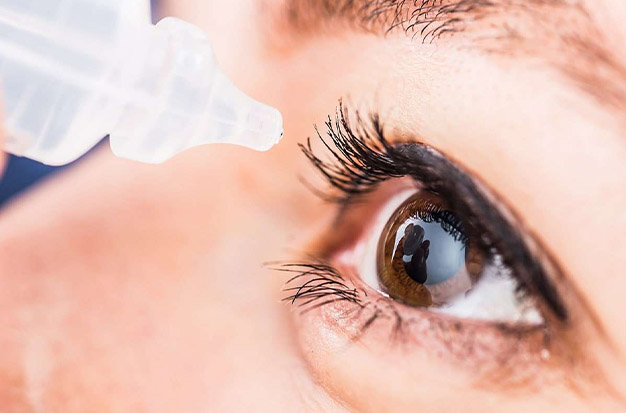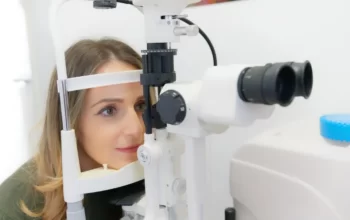
It’s not unusual to experience dry eye syndrome. In the USA, approximately 6.8 percent of adults experience the condition.
Insufficient tear production can lead to dry eye syndrome, also known as dry eye disease. Additionally, if the incorrect type of tears isn’t shed by your eyes, it might occur. Your eyes might become itchy, burning, or stinging as a result.
You can manage your symptoms in a number of ways, which is fortunate. For dry eyes, this includes taking various vitamins or supplements. It’s important to note that research into supplements for dry eyes is still in its early stages. Additionally, some vitamins can have adverse side effects if taken in excess. Speak to your doctor before taking supplements because you may already be consuming enough of some nutrients from your diet.
Continue reading to find out about vitamins for dry eyes as well as other natural treatments you can try at home.
Eye Health And Vitamins
Although there are possible connections between vitamins and minerals and eye health, these links are not yet established, and doctors need more proof before prescribing vitamins as a stand-alone dry eye treatment.
According to some studies, seniors who have trouble getting enough vitamins in their diets may benefit from taking supplements.
The minerals zinc and copper, the plant compounds lutein and zeaxanthin, and the vitamins C and E may help prevent the onset of some eye conditions, such as age-related macular degeneration (AMD), according to the large study AREDS.
Loss of vision in the macula is a symptom of AMD. The macula, which is a component of the eye, manages central vision.
Studies have also suggested that thiamin, among other vitamins and minerals, may help prevent cataracts or cloudy spots that develop in the eye’s lens.
Vitamins For Dry Eye Syndrome
There is insufficient scientific evidence to support the routine use of commercially available supplements in the treatment of dry eye syndrome. Vitamin supplementation is thought to help treat dry eyes, but the evidence is weak.
Some observational studies, however, suggest that diet may be important in preventing dry eyes.
Any vitamin, mineral, and herbal supplements that promise to treat dry eye syndrome should always be taken with caution.
The effects of the following vitamins on dry eyes are still being studied. Before attempting to treat dry eyes with supplements, patients should speak with a doctor.
Vitamin A
The protective barrier that vitamin A creates against bacteria aids in shielding the cornea of the eye from damage. The likelihood of eye infections can be decreased by this barrier.
Vitamin A deficiency, which is common in underprivileged populations, is primarily caused by a lack of food. Around the world, up to 50% of preschoolers have vitamin A deficiencies.
Dry eye can be avoided by eating foods high in vitamin A like carrots, spinach, tomatoes, and other orange and yellow produce. Vitamin A eye drops may be suggested by your ophthalmologist to treat dry eye symptoms.
For the purpose of treating dry eyes, researchers in one study compared prescription eye drop with vitamin A eye drops. Both kinds of eye drops significantly improved the participants’ participants’ hazy vision and tear film.
Vitamin B12
According to Sayegh, there are promising reports showing how vitamin B12 can aid patients with severe dry eye and pain.
Numerous studies have connected patients’ vitamin B12 deficiency to diseases that cause dry eyes. After experiencing blistering pain and a gritty sensation in her eye for a year, a patient in India reportedly experienced a dramatic improvement after using a B12 vitamin serum within three weeks. She was symptom-free after six months, according to the authors.
Vegans must take B12 supplements because vitamin B12 is only found in foods made from animals. Anemia, yellow skin, optic neuropathy, cognitive slowing, and peripheral neuropathy, which causes weakness or numbness in your extremities, are symptoms and signs of a B12 deficiency.
B12 is frequently injected, usually in the arm, buttock, or thigh, says Park, due to the variable absorption when taken orally.
Vitamin D

A fat-soluble vitamin is vitamin D. When you are exposed to sunlight, your skin produces vitamin D. Additionally, some foods and supplements contain it.
Dry eye symptoms may result from a vitamin D deficiency. However, a 2020 article by Trusted Source suggests that supplements might be helpful by lowering inflammation on the eye’s surface.
An investigation published in 2019 discovered that vitamin D supplementation enhances the effects of lubricating eye drops, another dry eye treatment. Additionally, a 2018 study found that taking oral vitamin D supplements reduced dry eye symptoms and improved tear quality.
There isn’t a recommended vitamin D dosage for the treatment of dry eyes as of yet. To avoid toxicity if you take vitamin D supplements, don’t take more than 4,000 IU daily. Vitamin D is a fat-soluble vitamin that can build up in the body, similar to vitamin A.
Vitamin E
“Although vitamin E is a crucial antioxidant, Sayegh notes that there has been no proof that supplementing with it directly improves dry eye.
A small study conducted in Spain in 2020 compared artificial tears made with the sodium derivative carmellose sodium to eye drops made of hyaluronic acid, coenzyme Q10, and vitamin E in patients going through menopause. It was discovered that using vitamin E eye drops on a daily basis at a lower dosage “was sufficient to achieve better dry eye disease management compared to carmellose.” However, it’s debatable whether the improvement can be entirely attributed to vitamin E.
Omega-3
A 2019 study found that omega-3 fats lower inflammation, which may help with dry eye symptoms like pain and irritation.
Eyelid inflammation and irritation are lessened by omega 3 because it slows down the body’s inflammatory response. The meibomian glands, which are located in the eyelids, are able to secrete enough oil into the tears as a result, preventing the tears from evaporating too quickly.
Fish, leafy green vegetables, vegetable oil, soybeans, nuts, and seeds all contain omega-3 fatty acids. Fish oil and flaxseed oil supplements might also be helpful.
As more research is done, connections between vitamins and minerals and dry eye syndrome are coming into greater focus. However, more investigation is required to fully comprehend the relationship between the two so that the best course of treatment can be suggested for people with dry eye.
Conclusion
The NIH and other organizations have recently conducted studies to look at the relationship between a number of vitamins and eye disease with promising, but inconclusive results — sparking more interest in such research. Despite the fact that there are no cures for dry eyes from supplements alone, this hasn’t stopped people from taking supplements.
Many medical professionals believe that using supplements containing fish oil or flaxseed to treat dry eyes could be beneficial and cause little harm. It’s best to consult a doctor before adding any of the aforementioned vitamins and supplements to your regimen because a variety of factors can contribute to dry eye, which can be a sign of other health issues.



